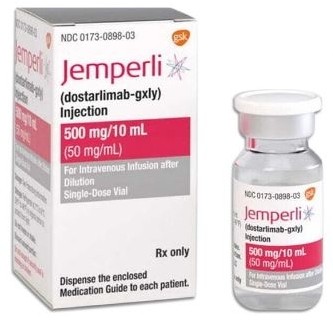GSK's Jemperli (dostarlimab) has secured the first-line treatment indication for endometrial cancer ahead of MSD's Keytruda (pembrolizumab), becoming the first immunotherapy in Korea to be approved for both first- and second-line treatment.

GSK Korea said its endometrial cancer drug Jemperli had received an additional indication from the Ministry of Food and Drug Safety (MFDS) for the first-line treatment of advanced or recurrent mismatch repair defect/high-frequency microsomal instability (dMMR/MSI-H) endometrial cancer in combination with platinum-based chemotherapy.
Jemperli is the third anti-PD-1 immuno-oncology drug approved in the U.S., joining Keytruda and Opdivo (nivolumab). It is indicated as monotherapy for treating adult patients with recurrent or advanced dMMR/MSI-H endometrial cancer who are on or have progressed after prior platinum-based systemic chemotherapy.
Jemperli and Keytruda have competed in endometrial cancer in Korea, where there are no alternatives to chemotherapy.
Keytruda first entered the market as a second-line treatment when it was approved in combination with Lenvima (lenvatinib) in December 2021 for treating advanced endometrial cancer without dMMR/MSI-H in women with confirmed progression after prior systemic therapy and who are ineligible for surgery and radiation.
However, the two treatments had different experiences getting insurance benefits later. While Keytruda sought coverage for multiple cancers and received a "re-discussion" decision for endometrial cancer from the Cancer Disease Review Committee, Jemperli won insurance coverage starting last December.
The first-line approval was based on RUBY, a global, randomized, double-blind, phase 3 study that evaluated Jemperli in combination with platinum-based chemotherapy (carboplatin plus paclitaxel) vs. placebo and platinum-based chemotherapy.
RUBY enrolled 494 patients with stage 3 or 4 advanced or recurrent endometrial cancer, 118 of whom had the dMMR/MSI-H biomarker. The primary endpoint was progression-free survival (PFS), assessed using Response Evaluation Criteria in Solid Tumors (RECIST).
Results showed that the Jemperli combination reduced the risk of disease progression or death by 72 percent (HR: 0.28 [95 percent CI: 0.16-0.50]) compared to control in patients with dMMR/MSI-H endometrial cancer. At a median follow-up of 24 months, PFS was 61.4 percent (95 percent CI: 46.3-73.4), compared to 15.7% (95 percent CI: 7.2-27.0) in the placebo arm, demonstrating superior clinical benefit.
In terms of safety, the most common adverse events for Jemperli in combination with platinum-based chemotherapy (carboplatin plus paclitaxel) were nausea, hair loss, and fatigue.
"Platinum-based chemotherapy (carboplatin plus paclitaxel) has long been the first-line standard of care for advanced and recurrent endometrial cancer, but its poor prognosis with a median overall survival of less than three years has led to high unmet need," said Professor Kim Jae-hoon of the Department of Obstetrics and Gynecology at Gangnam Severance Hospital.
Professor Kim went on to say, The combination of Jemperli and platinum-based chemotherapy demonstrated significant improvements in both progression-free survival and overall survival in the dMMR/MSI-H population in the RUBY study, and we have high expectations for the clinical effectiveness of Jemperli in first-line treatment, especially given the inclusion of high-risk patients, such as those with carcinosarcoma.”

